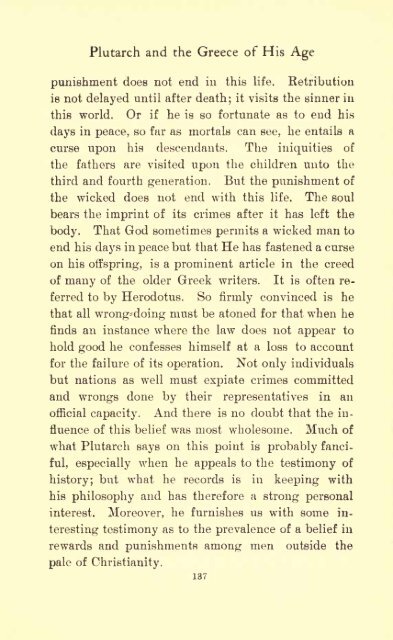Between Heathenism and Christianity - College of Stoic Philosophers
Between Heathenism and Christianity - College of Stoic Philosophers
Between Heathenism and Christianity - College of Stoic Philosophers
You also want an ePaper? Increase the reach of your titles
YUMPU automatically turns print PDFs into web optimized ePapers that Google loves.
Plutarch <strong>and</strong> the Greece <strong>of</strong> His Age<br />
punishment does not end in this life. Retribution<br />
is not delayed until after death; it visits the sinner in<br />
this world. Or if he is so fortunate as to end his<br />
clays in peace, so far as mortals can see, he entails a<br />
curse upon his descendants. The iniquities <strong>of</strong><br />
the fathers are visited upon the children unto the<br />
third <strong>and</strong> fourth generation. But the punishment <strong>of</strong><br />
the wicked does not end with this life. The soul<br />
bears the imprint <strong>of</strong> its crimes after it has left the<br />
That God sometimes permits a wicked man to<br />
body.<br />
end his days in peace but that He has fastened a curse<br />
on his <strong>of</strong>fspring, is a prominent article in the creed<br />
<strong>of</strong> many <strong>of</strong> the older Greek writers. It is <strong>of</strong>ten re<br />
ferred to by Herodotus. So firmly convinced is he<br />
that all wrong-doing must be atoned for that when he<br />
finds an instance where the law does not appear to<br />
hold good he confesses himself at a loss to account<br />
for the failure <strong>of</strong> its operation. Not only individuals<br />
but nations as well must expiate crimes committed<br />
<strong>and</strong> wrongs done by their representatives in an<br />
<strong>of</strong>ficial capacity. And there is no doubt that the in<br />
fluence <strong>of</strong> this belief was most wholesome. Much <strong>of</strong><br />
what Plutarch says on this point is probably fanci<br />
ful, especially \vhen he appeals to the testimony <strong>of</strong><br />
history; but what he records is in keeping with<br />
his philosophy <strong>and</strong> has therefore a strong personal<br />
interest. Moreover, he furnishes us with some in<br />
teresting testimony as to the prevalence <strong>of</strong> a belief in<br />
rewards <strong>and</strong> punishments among men outside the<br />
pale <strong>of</strong> <strong>Christianity</strong>.<br />
187
















